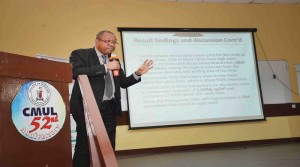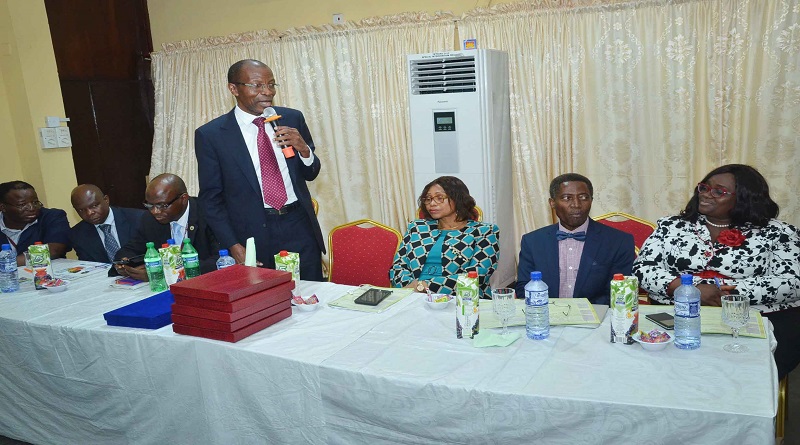Stakeholders agree on phase down target for dental amalgam in Nigeria
Dental practitioners including doctors, nurses, technicians, academia, pharmaceutical industry and civil society groups have agreed to discourage and stop amalgam use in children’s primary teeth by December 2017.
Besides, they have also agreed to review and update dental schools training curriculum to emphasise mercury-free dentistry by mid 2017 while urging government to initiate a coordinated muitl-sectorial approach for an effective phase down of dental amalgam use in Nigeria.
These were some of the agreements/recommendations reached in a communique issued at the end of a two-day stakeholders’ forum on Phase Down of Amalgam-The Alternatives to mark the 10th annual scientific conference of the Faculty of Dental Sciences, College of Medicine, University of Lagos penultimate week.
The communiqué issued read in part, “Government should initiate a coordinated multi-sectoral approach for an effective phase down of dental amalgam use in Nigeria; raising awareness about dental mercury and promotion of Alternatives/Transition to alternatives.
“Initiation of demonstration projects (pilot hospitals) and application of best available technology and environmental practice in the management of dental amalgam; the urgent need for NAFDAC to include phase-down programme in her awareness campaign which includes engaging the media in awareness creation on the health impacts of mercury in dental amalgam and creation of special fund for dental schoolsâ€.

Participants observed that there is low level of awareness among Nigerians on the dangers of mercury as dental amalgam is still widely used in the country.
They noted that alternative direct restorative materials such as composite, compomer and ceramics can be used for restoration of carious posterior teeth based on specific selection criteria and indications.
In his opening address, Dean, Faculty of Dental Sciences, College of Medicine, University of Lagos, Prof. Godwin Arotiba, said the phasing down of dental amalgam is an issue of global importance that requires an urgent national action.
He further noted that a road map for dental amalgam phase down for Nigeria Dental institutions; draft action plan for mercury free dentistry implementation are expected as outcomes of the conference.
Minister of Education, Mallam Adamu Adamu, represented by Mrs. Stella Olagunju, commended the organisers on a very important topical issue on the phase down of Dental Amalgam and stated the willingness of her ministry to accept the decision on dental curriculum change in Nigeria with emphasis on phase down from dental amalgam use to mercury-free alternatives into the National education curriculum.
Federal Ministry of Environment representative, Mr Olubunmi Olusanya, who stood in for Dr Idris Goji noted that mercury emission and releases poses health and environmental concerns and that satisfactory alternatives to dental amalgam are available in Nigeria.
He called for a national road map in line with the national phase down plan which would help to save lives.
National Agency for Food and Drug Administration and Control (NAFDAC) representative Dr. Anthony Hotton  stressed that the organisation regulates the importation, sales, use, manufacturing and distribution of chemicals which are grouped as general, controlled or restricted chemicals.
Specifically, he said mercury and its compounds are placed under restriction due to its health impact, hence, the call for the need for a National Action Plan (NAP) and goal setting for monitoring companies and also inter-phasing with dental practitioners to eliminate or phase down amalgam use in Africa.
Keynote speaker, Prof. Adeyemi Olusile, a past President of Nigerian Dental Association (NDA) and presently the President of African Regional Organisation of World Dental Federation (FDI), outlined the effect of mercury on the environment and health especially occupational exposures.
Olusile strongly called for the inclusion of dental amalgam alternatives filling materials in the National Health Insurance Scheme in Nigeria. He noted that curriculum changes into dental amalgam alternatives is already in place in some institutions like LUTH, University College Hospital, Ibadan; Lagos State University Teaching Hospital (LASUTH), Obafemi Awolowo University and other schools.
“The reality is that whether we like it or not, soon and very soon, amalgam will no longer be available for use, we do not manufacture amalgam in Nigeria, we import it and if the countries from where we import no longer export. We have to use the alternativesâ€, said Prof, Olusile.
The conference which brought together over 140 participants also agreed on a road map for phasing down of dental amalgam in Nigeria that will cumulate in implementation of the regulation at all sectoral levels- imports of dental materials, dental practices, and consumer education among others in December 2019.
Kayode Aboyeji




